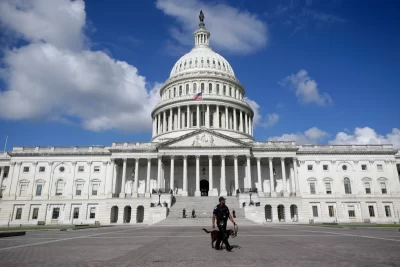
Congressional Republicans scored a massive victory this summer when they passed President Donald Trump’s tax and spending cuts without a single Democratic vote. But as they return to Washington this fall after a monthlong August recess, they will have to find a way to work with Democrats — or around them — as a government shutdown looms.
The annual spending battle will dominate the September agenda, along with a possible effort by Senate Republicans to change their chamber’s rules to thwart Democratic stalling tactics on nominations. The Senate is also debating whether to move forward on legislation that would slap steep tariffs on some of Russia’s trading partners as the U.S. presses Russian President Vladimir Putin on Ukraine.
In the House, Republicans will continue their investigations of former President Joe Biden while Speaker Mike Johnson navigates a split in his conference over whether the Trump administration should release more files in the Jeffrey Epstein investigation.
A look at what Congress will be doing as lawmakers return from the August break:
The priority is to keep the government open
The most urgent task for Congress is to avoid a government shutdown on Sept. 30, when federal funding runs out. And it’s so far unclear if Republicans and Democrats will be able to agree on how to do that.
Congress will have to pass a short-term spending measure to keep the government funded for a few weeks or months while they try to finish the full-year package. But Republicans will need Democratic votes to pass an extension, and Democrats will want significant concessions. Senate Democratic Leader Chuck Schumer’s vote with Republicans to avoid a shutdown in March prompted furious backlash within his party.
Democrats have warned that such efforts could tank the broader negotiations. “Trump is rooting for a shutdown,” Sen. Chris Murphy, D-Conn., posted on social media Friday.
Senate nominations fight looms
Senators are expected to return to Washington right where they left off in early August — fighting over Trump’s nominees.
Exasperated Republicans fled Washington for the month after making little headway with Senate Democrats over their nominations blockade, which has forced delays in confirmations and angered Trump as many of his administration’s positions remain unfilled. Republican leaders called it quits after a rare Saturday session that ended with a breakdown in bipartisan negotiations and Trump posting on social media that Chuck Schumer could “GO TO HELL!”
Republicans now say they’re ready to try and change Senate rules to get around the Democratic delays, and they are expected to spend the next several weeks discussing how that might work.
Stiffer Russia sanctions are sought
Republican Sen. Lindsey Graham of South Carolina, one of Trump’s closest congressional allies, has pushed the president for months to support his sweeping bipartisan sanctions bill that would impose steep tariffs on countries that are fueling Russia’s invasion of Ukraine by buying its oil, gas, uranium, and other exports. The legislation has the backing of 85 senators, but Trump has yet to endorse it, and Republican leaders have so far said they won’t move without him.
Graham has stepped up his calls after Trump met with Russian President Vladimir Putin and Ukrainian President Volodymir Zelenskyy last month in hopes of a peace deal. Since then, Russia has continued to step up attacks on Ukraine.
“If we don’t have this thing moving in the right direction by the time we get back, then I think that plan B needs to kick in,” Graham said of his bill in an interview with The Associated Press last month.




